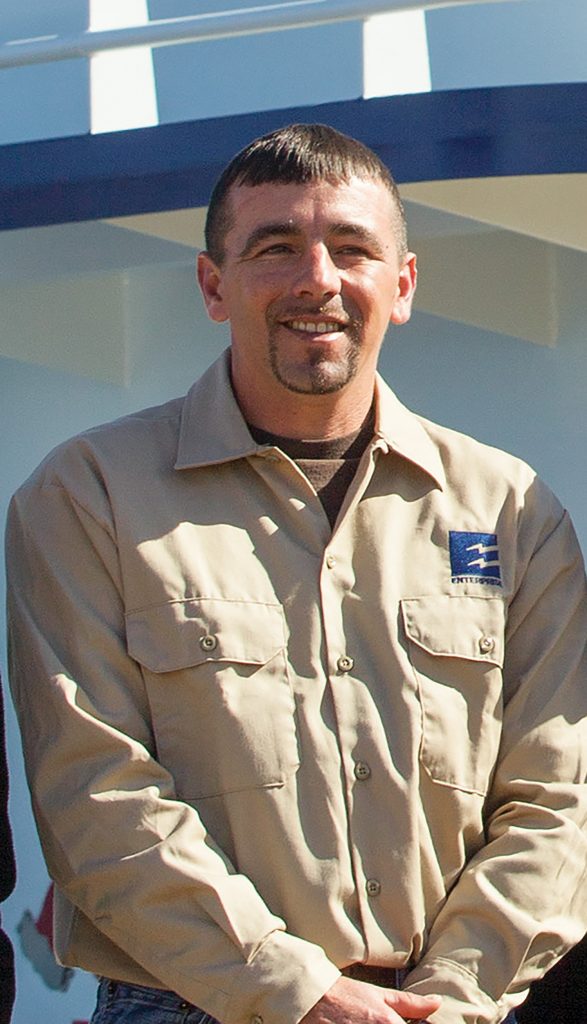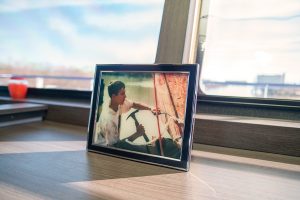Captain Profile: Capt. Terry Lirette, Enterprise Marine

When Enterprise Marine Services christened its newest towboat, the mv. Ray S, January 15, on display in the vessel’s wheelhouse was a framed picture of a young Terry Lirette, caulking his family’s wooden-hulled oyster lugger.
With blade and mallet in hand, Lirette is pictured skillfully driving fresh cotton rope into the seams of the oyster harvesting boat to seal and stabilize the hull.
Now the lead captain aboard the mv. Ray S and with just over 17 years experience working on towboats, Lirette remains quite proud of his roots and his family’s commercial fishing legacy. His grandfather’s generation made their living trapping and fishing for oysters and shrimp. His father carried on that livelihood.
“My father, he just retired in the last two years,” Lirette said. “He fished oysters his whole life. He raised me and three girls fishing oysters.”
Commercial fishing played such a central role in his family that Lirette spent as much or even more time with his feet planted on the deck of a boat as he did on the “good earth” of Terrebonne Parish, La.
“I’ve been on the boats all my life, so it’s kind of like home being on the water,” Lirette said. “That’s what I was brought up doing, actually working on the water.”
Then in 2001, Lirette decided to switch from trawling for shrimp and dredging oysters to pushing barges aboard a towing vessel. That’s when he started out as a deckhand for Cenac Towing, a company he was already familiar with.
“I’m from Bayou Dularge, so there was always Cenac Towing at the beginning of the road,” Lirette said. “I started out as a deckhand with Cenac Towing back in 2001—January 16, 2001. I just worked my way up the ladder, you know.”
Lirette said working on a commercial fishing vessel has its similarities to a towing vessel. For starters, there’s the close attention to detail and the skill needed to keep the boat at work. But Lirette said he’s happy to have the regular schedule of the towboat.
“In commercial fishing, sometimes you got to work around the clock,” he said.
He also said the towing industry many times is more stable than commercial fishing.
“When the prices go up and down on certain things, you struggle financially in commercial fishing, where on the towboat you get a steady income,” he said.
Eight months after he started out as a deckhand, Lirette moved up to the tankerman position for Cenac. Then in 2008, he moved into the wheelhouse. Lirette is one of many Enterprise employees who were formerly with Cenac Towing, stayed on when the company became part of TEPPCO in 2008, then joined Enterprise in 2009.
From his days commercial fishing, to working every position on a towing vessel, Lirette is passionate about leading his crew to work as a team and passing his knowledge on to younger crew members.
“I can relate to the guys coming up on the vessel, because I’ve been in their shoes at one point in time,” Lirette said. “You can teach them because you learned every aspect of the job.”
Lirette doesn’t just do that from the wheelhouse. He gets out on the deck, working shoulder to shoulder with his crew.

“Even though I’m captain of the vessel, I’ll get out there and work with my guys like I’m a deckhand,” he said. “I believe it makes for a strong crew. The guys respect you more as their captain. They see you’re not scared to get out there and work.”
And as committed to his crew as he is, Lirette is even more dedicated to his family, which supports him while he’s working the 20 and 10 schedule. Lirette and his wife have one son and one daughter.
“I strongly believe you need a strong family at home to do this job that we do, because it is really rough on them,” he said.
Lirette said technology certainly allows him to stay in closer contact while he’s at work. FaceTime is a world away from coin slots on pay phones, he said.
“I remember we used to have to go to the pay phones when we got to the docks,” he said. “We used to have to use the pay phones at the facilities to contact our families from one port to the next.”
And now, 18 years after starting out on towboats, Lirette said he’s excited to pass the family legacy of working on the water to his 17-year-old son.
“I was 5, 6, 7 years old on the oyster boat with my dad,” Lirette said. “As far back as I can remember, I’ve been out on the water. It was something passed down throughout the family.
“My little boy is already talking about he’s going to be a captain one day,” he added. “He’ll be 18 next year; he just turned 17. He can’t wait to go out and start working on the water.”



